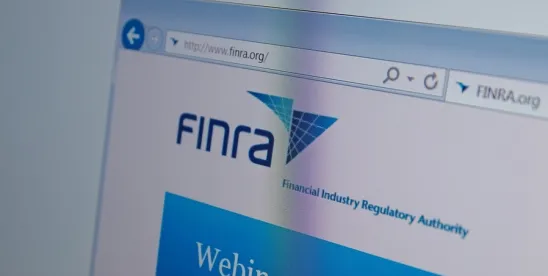On September 4, 2024, the United States District Court for the Eastern District of Pennsylvania denied D. Allen Blankenship’s challenge to enjoin the Financial Industry Regulatory Authority’s (FINRA) disciplinary action against him.[1] Relying on the recent U.S. Supreme Court decision in SEC v. Jarkesy, Blankenship argued that FINRA’s in-house disciplinary proceedings were unconstitutional. Without reaching the merits of Blankenship’s challenge, however, the district court dismissed the action for lack of subject-matter jurisdiction.
Background
On December 7, 2023, FINRA’s Department of Enforcement filed a disciplinary action against Blankenship, a registered broker, with FINRA’s Office of Hearing Officers (OHO). Shortly before his hearing date, on July 10, 2024, Blankenship filed a complaint in the Eastern District of Pennsylvania claiming that, similarly to Jarkesy, because the charges against him were analogous to common law fraud claims and he was subject to civil penalties, the hearing would violate his Seventh Amendment right to a jury trial.
In Jarkesy, which was decided less than a month earlier, on June 27, 2024, the U.S. Supreme Court heard a challenge to the Securities and Exchange Commission’s (SEC) in-house administrative law judge (ALJ) proceedings. In that case, the SEC initiated an administrative proceeding against Jarkesy for securities fraud. After a hearing, the ALJ found Jarkesy liable for securities fraud violations and ordered him to pay civil penalties. Jarkesy subsequently appealed the decision, arguing, among other things, that the proceeding violated his Seventh Amendment right to a jury trial.
The Supreme Court ultimately agreed with Jarksey, finding that the SEC’s antifraud provisions replicate common law fraud because the civil penalties for an antifraud violation are punitive rather than restorative or compensatory. Focusing on the parallels to common law fraud and the availability of punitive civil penalties, the Court held that Congress was prohibited from removing such cases from the purview of Article III jurisdiction. Accordingly, the Seventh Amendment applied and a jury trial was required.
The Eastern District of Pennsylvania, however, held that it did not need to assess Blankenship’s underlying arguments because the district court lacked the requisite subject-matter jurisdiction over Blankenship’s collateral attack on the FINRA in-house proceeding. In coming to its conclusion, the district court analyzed three factors, known as the Thunder Basin factors, to determine if the statutory review scheme at issue superseded its jurisdiction: [1] “could precluding district court jurisdiction ‘foreclose all meaningful judicial review’ of the claim;” [2] “is the claim ‘wholly collateral to [the] statute’s review provisions;’” and [3] “is the claim ‘outside the agency’s expertise?’”[2]
According to the district court, FINRA’s in-house proceeding does not preclude Blankenship from obtaining meaningful judicial review per the first Thunder Basin factor. Respondents in OHO proceedings can appeal an OHO decision to the National Adjudicatory Counsel (NAC). After a review and decision by the NAC, respondents can then request review of the NAC decision by the SEC. And finally, an order by the SEC can be appealed to the appropriate U.S. Court of Appeals. Therefore, Blankenship could obtain a full review of his claims by an Article III court. In addition, despite having to navigate through these stages of review, the district court reasoned that any injury would be able to be “meaningfully” addressed by the judicial review.
The second and third Thunder Basin factors similarly weighed against the existence of subject-matter jurisdiction. The district court found that Blankenship’s Seventh Amendment claim was not wholly collateral to the Securities Exchange Act’s review provisions because it did not challenge FINRA’s power to proceed but rather the actions FINRA could take in the proceeding. The district court also found that the interpretation and application of FINRA’s rules were within both FINRA’s and the SEC’s expertise. As a result of all three factors pointing in the same direction, the district court concluded that it lacked subject-matter jurisdiction. Blankenship, like Jarkesy, would have to pursue his theory on direct appeal.
Key Takeaways
Blankenship’s challenge to FINRA’s in-house disciplinary proceedings is likely to be just the first of such challenges. Jarkesy opened the door and provided a roadmap for copycat litigation attacking in-house disciplinary proceedings, and future respondents will undoubtedly take lessons from the Blankenship opinion. The next challenge FINRA faces, therefore, may not be able to be dispensed with at the jurisdictional stage.
For related information, please see any of the following articles:
- U.S. Supreme Court Rules SEC Must Try Securities Fraud Cases in Federal Jury Trials Rather than In-House Courts
- The Fifth Circuit Strikes a Blow to the Constitutionality of SEC Administrative Proceedings
- The End of Chevron Deference and the Implications for the SEC
[1] Blankenship v. FINRA, Case No. 2:24-cv-03003-JFM, 2024 WL 4043442 (E.D. Pa. Sept. 4, 2024).
[2] Axon Enter., Inc. v. FTC, 598 U.S. 175, 186 (2023) (quoting Thunder Basin Coal Co. v. Reich, 510 U.S. 200, 212-13 (1994).





 />i
/>i
